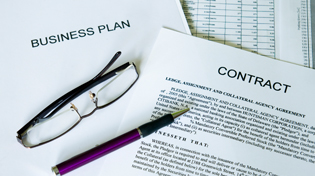Why do you need a business plan?
A business plan is a blueprint for maintaining or expanding a business. It can be a summary of an existing store or a method of setting down goals and strategies for improvement or change.
Not all retailers have business plans. Many seem to manage quite well without one.
However, small retail businesses often have to rely on slim profit margins and high stock turnover to maintain a profit. As a result, planning is vital.
If you are serious about making a success of your own business, you should have a business plan.
Your business plan explains your goals and objectives. It outlines the products you offer, your market situation, strategies to achieve your goals, and includes relevant financial information.
This is why the benchmarking process is so important. Without precise knowledge of how your business is performing, you cannot create an accurate plan for the future.
You need to know where you have “been” before you can try to predict where you will go.
How benchmarking helps you plan
As part of the benchmarking process, you should have already analysed your business’ performance.
Creating a business plan, based on the benchmarking process, helps you:
Identify goals and objectives
Develop strategies to meet those objectives
Highlight problems and suggests ways to improve them
Define the business structure
Obtain finance if required.
The different reasons for the plan’s creation can influence its appearance.
Many plans are initially created in order to borrow money. They become the finance proposal used when approaching banks or other institutions for a loan, and contain the requisite information for evaluating the potential of the business.
Other plans are created as a guide for planning future development, and so form a tool for management. Their aim is to give the business owner an accurate picture of the business as it is at present, and to provide a template for future changes.
Whatever reason for its creation, it is very important that it’s a good plan. This is as opposed to a good-looking but ‘bad’ plan. This might sound confusing, but there is an
important difference.
The ‘bad’, plan can look impressive, and be beautifully presented. However, if its information is not completely accurate and carefully worked-out, it cannot be used to help the business owner make the best choices for the future.
Decisions made could be founded upon inaccurate information, could lead to a waste of money and time, and could jeopardise the business’ viability.
A ‘good’ plan on the other hand, includes pertinent and accurate information. It provides the business owner with a true depiction of the present circumstances and influences impacting on the business, as well as incorporating well thought-out and feasible details
of the goals, objectives, and strategies needed to achieve these.
Creating your own business plan will help you think through all the aspects of your business as it is now, and also what you wish to achieve in the future.
Additionally, it will help you make decisions based on anticipated outcomes, rather than on instinct, or on seemingly good opportunities. It will help you make decisions from a position of strength.











